Ethical Dilemmas in Nursing: Analyzing a Post-Discharge Suicide Case
VerifiedAdded on 2023/06/13
|6
|1486
|78
Case Study
AI Summary
This case study examines the ethical implications surrounding the suicide of a patient, Mr. R, after being discharged from a psychiatric ward where he was treated for Treatment Resistant Depression (TRD). The analysis centers on two perspectives: Post 1 argues that the healthcare professionals, particularly registered nurse Rita, acted ethically by adhering to their duty of care and professional standards, emphasizing that Mr. R's decision to commit suicide outside the healthcare setting absolves them of responsibility. This perspective highlights the ethical principles of beneficence, non-maleficence, autonomy, and justice. Conversely, Post 2 contends that the healthcare professionals breached ethical standards by failing to obtain informed consent for a complex procedure, deep brain stimulation (DBS), potentially violating the patient's autonomy. It questions whether the patient was fully informed about the risks associated with DBS, including suicide and mood changes. The case study concludes by acknowledging the inherent ethical dilemmas in nursing practice and the importance of adhering to ethical principles and professional standards while providing patient care. Desklib offers a range of study tools and resources for students exploring similar topics.
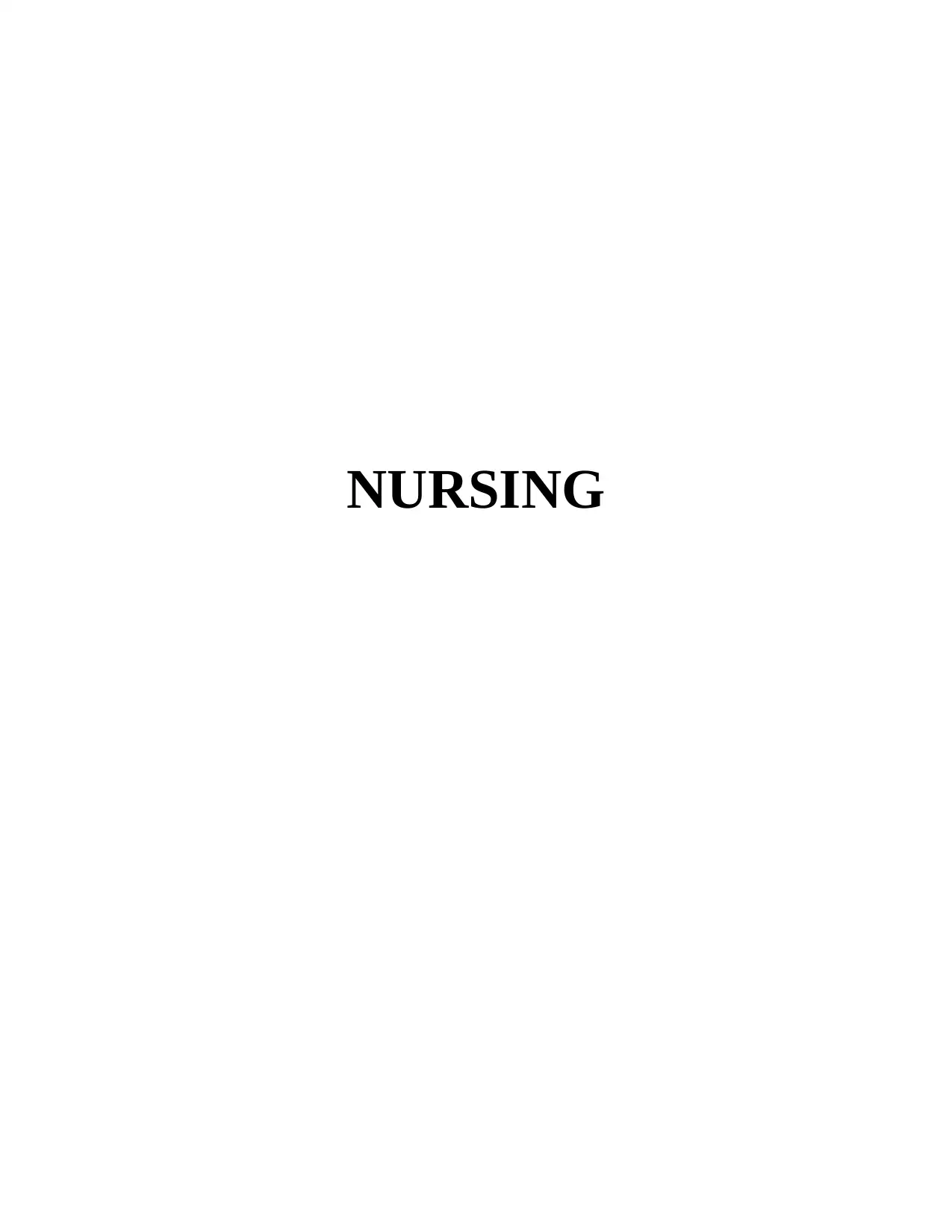
NURSING
Paraphrase This Document
Need a fresh take? Get an instant paraphrase of this document with our AI Paraphraser
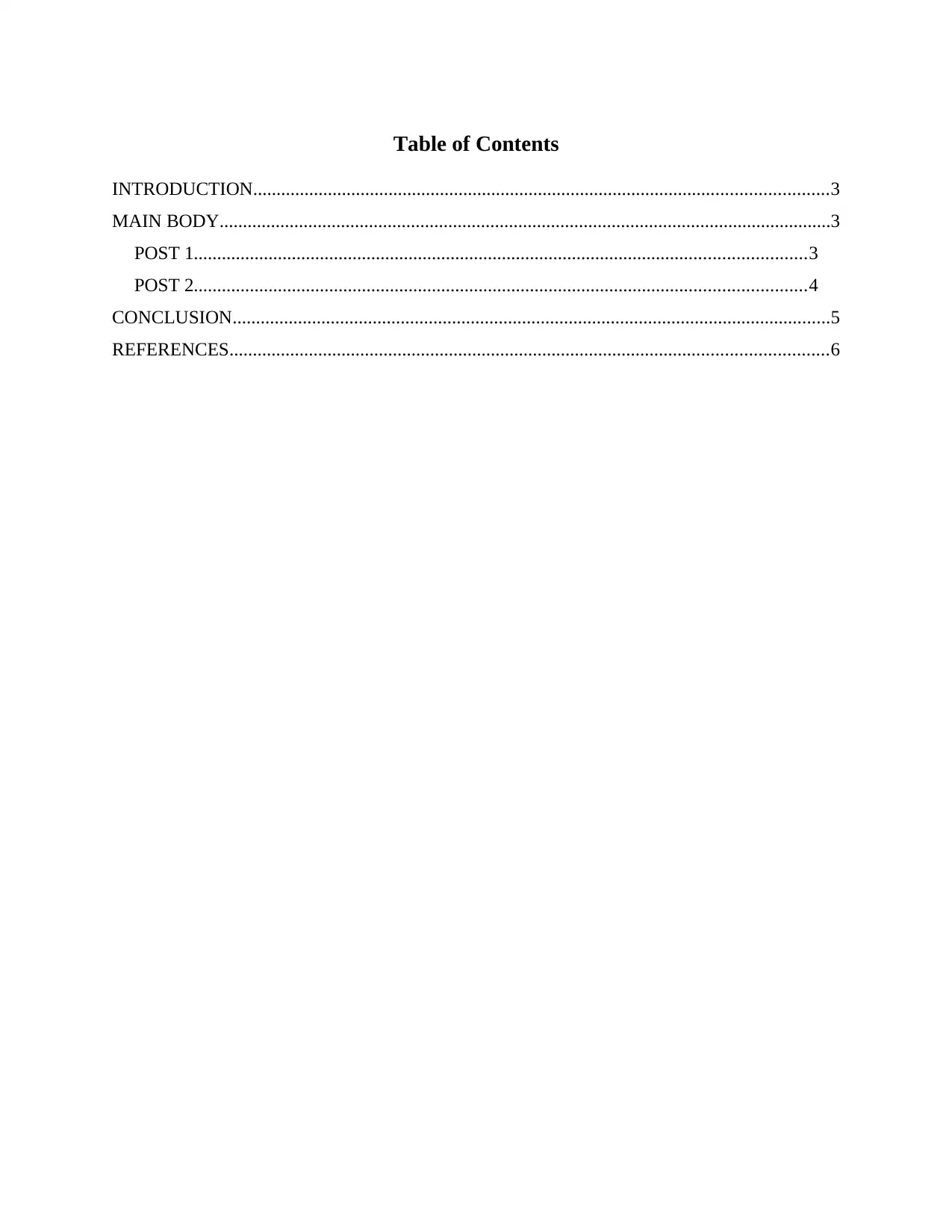
Table of Contents
INTRODUCTION...........................................................................................................................3
MAIN BODY...................................................................................................................................3
POST 1...................................................................................................................................3
POST 2...................................................................................................................................4
CONCLUSION................................................................................................................................5
REFERENCES................................................................................................................................6
INTRODUCTION...........................................................................................................................3
MAIN BODY...................................................................................................................................3
POST 1...................................................................................................................................3
POST 2...................................................................................................................................4
CONCLUSION................................................................................................................................5
REFERENCES................................................................................................................................6
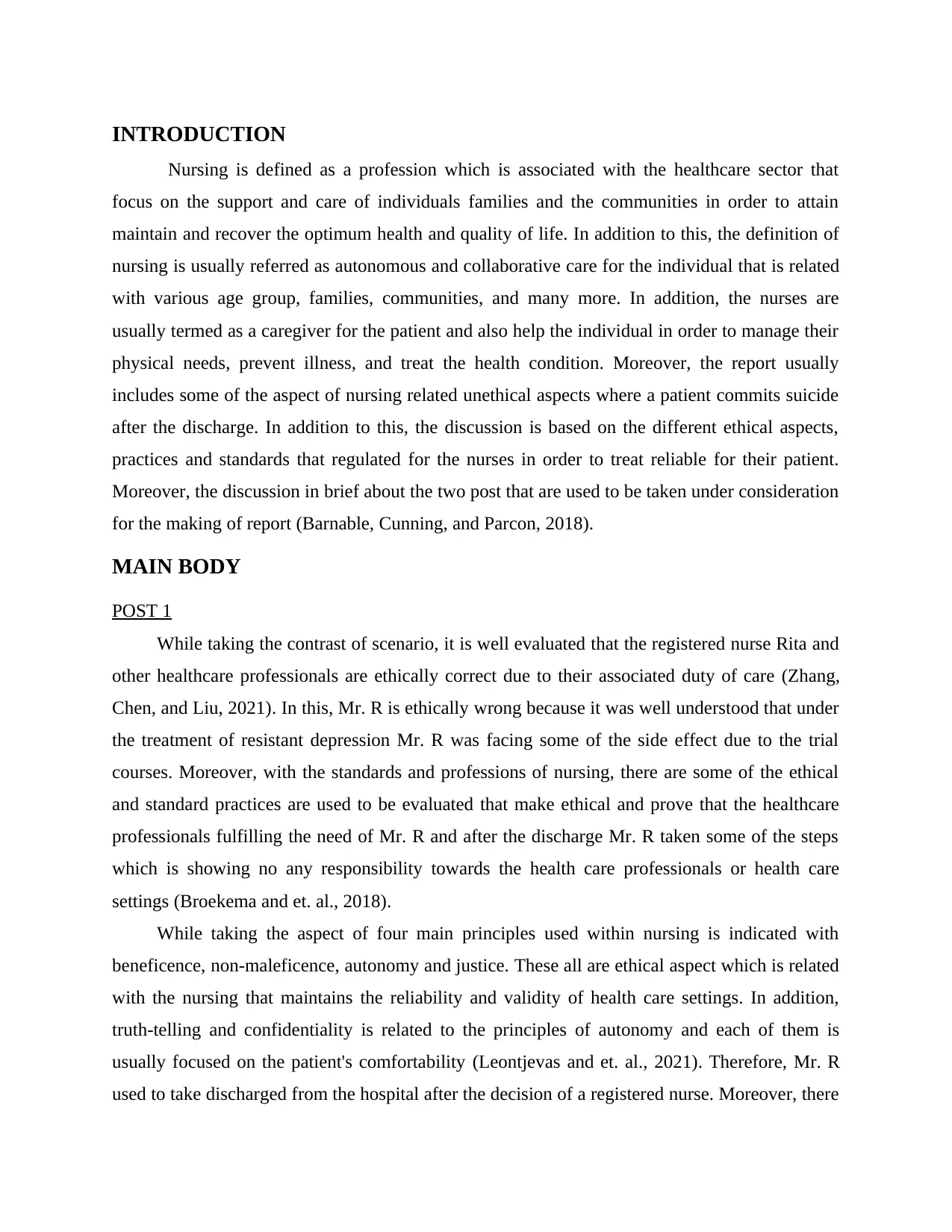
INTRODUCTION
Nursing is defined as a profession which is associated with the healthcare sector that
focus on the support and care of individuals families and the communities in order to attain
maintain and recover the optimum health and quality of life. In addition to this, the definition of
nursing is usually referred as autonomous and collaborative care for the individual that is related
with various age group, families, communities, and many more. In addition, the nurses are
usually termed as a caregiver for the patient and also help the individual in order to manage their
physical needs, prevent illness, and treat the health condition. Moreover, the report usually
includes some of the aspect of nursing related unethical aspects where a patient commits suicide
after the discharge. In addition to this, the discussion is based on the different ethical aspects,
practices and standards that regulated for the nurses in order to treat reliable for their patient.
Moreover, the discussion in brief about the two post that are used to be taken under consideration
for the making of report (Barnable, Cunning, and Parcon, 2018).
MAIN BODY
POST 1
While taking the contrast of scenario, it is well evaluated that the registered nurse Rita and
other healthcare professionals are ethically correct due to their associated duty of care (Zhang,
Chen, and Liu, 2021). In this, Mr. R is ethically wrong because it was well understood that under
the treatment of resistant depression Mr. R was facing some of the side effect due to the trial
courses. Moreover, with the standards and professions of nursing, there are some of the ethical
and standard practices are used to be evaluated that make ethical and prove that the healthcare
professionals fulfilling the need of Mr. R and after the discharge Mr. R taken some of the steps
which is showing no any responsibility towards the health care professionals or health care
settings (Broekema and et. al., 2018).
While taking the aspect of four main principles used within nursing is indicated with
beneficence, non-maleficence, autonomy and justice. These all are ethical aspect which is related
with the nursing that maintains the reliability and validity of health care settings. In addition,
truth-telling and confidentiality is related to the principles of autonomy and each of them is
usually focused on the patient's comfortability (Leontjevas and et. al., 2021). Therefore, Mr. R
used to take discharged from the hospital after the decision of a registered nurse. Moreover, there
Nursing is defined as a profession which is associated with the healthcare sector that
focus on the support and care of individuals families and the communities in order to attain
maintain and recover the optimum health and quality of life. In addition to this, the definition of
nursing is usually referred as autonomous and collaborative care for the individual that is related
with various age group, families, communities, and many more. In addition, the nurses are
usually termed as a caregiver for the patient and also help the individual in order to manage their
physical needs, prevent illness, and treat the health condition. Moreover, the report usually
includes some of the aspect of nursing related unethical aspects where a patient commits suicide
after the discharge. In addition to this, the discussion is based on the different ethical aspects,
practices and standards that regulated for the nurses in order to treat reliable for their patient.
Moreover, the discussion in brief about the two post that are used to be taken under consideration
for the making of report (Barnable, Cunning, and Parcon, 2018).
MAIN BODY
POST 1
While taking the contrast of scenario, it is well evaluated that the registered nurse Rita and
other healthcare professionals are ethically correct due to their associated duty of care (Zhang,
Chen, and Liu, 2021). In this, Mr. R is ethically wrong because it was well understood that under
the treatment of resistant depression Mr. R was facing some of the side effect due to the trial
courses. Moreover, with the standards and professions of nursing, there are some of the ethical
and standard practices are used to be evaluated that make ethical and prove that the healthcare
professionals fulfilling the need of Mr. R and after the discharge Mr. R taken some of the steps
which is showing no any responsibility towards the health care professionals or health care
settings (Broekema and et. al., 2018).
While taking the aspect of four main principles used within nursing is indicated with
beneficence, non-maleficence, autonomy and justice. These all are ethical aspect which is related
with the nursing that maintains the reliability and validity of health care settings. In addition,
truth-telling and confidentiality is related to the principles of autonomy and each of them is
usually focused on the patient's comfortability (Leontjevas and et. al., 2021). Therefore, Mr. R
used to take discharged from the hospital after the decision of a registered nurse. Moreover, there
⊘ This is a preview!⊘
Do you want full access?
Subscribe today to unlock all pages.

Trusted by 1+ million students worldwide
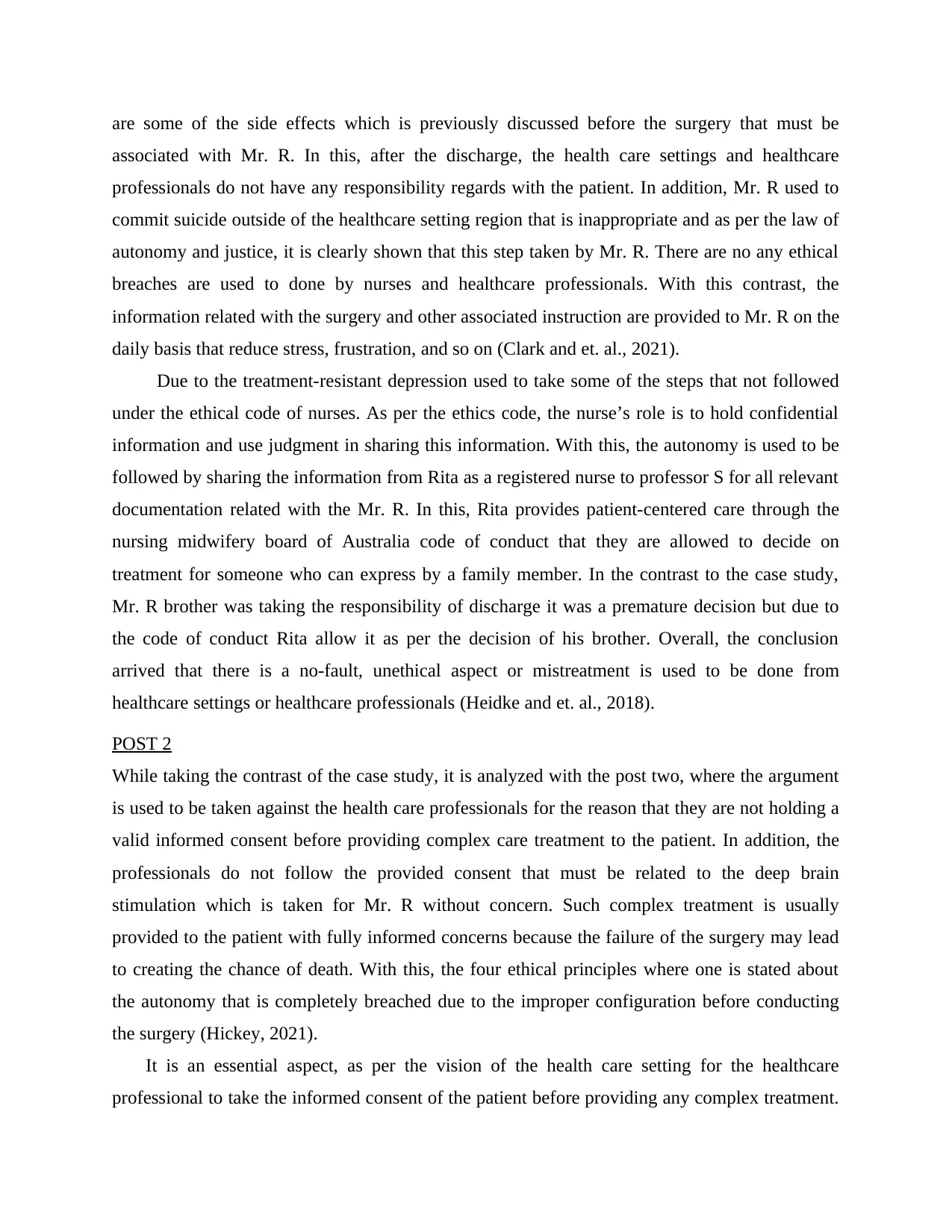
are some of the side effects which is previously discussed before the surgery that must be
associated with Mr. R. In this, after the discharge, the health care settings and healthcare
professionals do not have any responsibility regards with the patient. In addition, Mr. R used to
commit suicide outside of the healthcare setting region that is inappropriate and as per the law of
autonomy and justice, it is clearly shown that this step taken by Mr. R. There are no any ethical
breaches are used to done by nurses and healthcare professionals. With this contrast, the
information related with the surgery and other associated instruction are provided to Mr. R on the
daily basis that reduce stress, frustration, and so on (Clark and et. al., 2021).
Due to the treatment-resistant depression used to take some of the steps that not followed
under the ethical code of nurses. As per the ethics code, the nurse’s role is to hold confidential
information and use judgment in sharing this information. With this, the autonomy is used to be
followed by sharing the information from Rita as a registered nurse to professor S for all relevant
documentation related with the Mr. R. In this, Rita provides patient-centered care through the
nursing midwifery board of Australia code of conduct that they are allowed to decide on
treatment for someone who can express by a family member. In the contrast to the case study,
Mr. R brother was taking the responsibility of discharge it was a premature decision but due to
the code of conduct Rita allow it as per the decision of his brother. Overall, the conclusion
arrived that there is a no-fault, unethical aspect or mistreatment is used to be done from
healthcare settings or healthcare professionals (Heidke and et. al., 2018).
POST 2
While taking the contrast of the case study, it is analyzed with the post two, where the argument
is used to be taken against the health care professionals for the reason that they are not holding a
valid informed consent before providing complex care treatment to the patient. In addition, the
professionals do not follow the provided consent that must be related to the deep brain
stimulation which is taken for Mr. R without concern. Such complex treatment is usually
provided to the patient with fully informed concerns because the failure of the surgery may lead
to creating the chance of death. With this, the four ethical principles where one is stated about
the autonomy that is completely breached due to the improper configuration before conducting
the surgery (Hickey, 2021).
It is an essential aspect, as per the vision of the health care setting for the healthcare
professional to take the informed consent of the patient before providing any complex treatment.
associated with Mr. R. In this, after the discharge, the health care settings and healthcare
professionals do not have any responsibility regards with the patient. In addition, Mr. R used to
commit suicide outside of the healthcare setting region that is inappropriate and as per the law of
autonomy and justice, it is clearly shown that this step taken by Mr. R. There are no any ethical
breaches are used to done by nurses and healthcare professionals. With this contrast, the
information related with the surgery and other associated instruction are provided to Mr. R on the
daily basis that reduce stress, frustration, and so on (Clark and et. al., 2021).
Due to the treatment-resistant depression used to take some of the steps that not followed
under the ethical code of nurses. As per the ethics code, the nurse’s role is to hold confidential
information and use judgment in sharing this information. With this, the autonomy is used to be
followed by sharing the information from Rita as a registered nurse to professor S for all relevant
documentation related with the Mr. R. In this, Rita provides patient-centered care through the
nursing midwifery board of Australia code of conduct that they are allowed to decide on
treatment for someone who can express by a family member. In the contrast to the case study,
Mr. R brother was taking the responsibility of discharge it was a premature decision but due to
the code of conduct Rita allow it as per the decision of his brother. Overall, the conclusion
arrived that there is a no-fault, unethical aspect or mistreatment is used to be done from
healthcare settings or healthcare professionals (Heidke and et. al., 2018).
POST 2
While taking the contrast of the case study, it is analyzed with the post two, where the argument
is used to be taken against the health care professionals for the reason that they are not holding a
valid informed consent before providing complex care treatment to the patient. In addition, the
professionals do not follow the provided consent that must be related to the deep brain
stimulation which is taken for Mr. R without concern. Such complex treatment is usually
provided to the patient with fully informed concerns because the failure of the surgery may lead
to creating the chance of death. With this, the four ethical principles where one is stated about
the autonomy that is completely breached due to the improper configuration before conducting
the surgery (Hickey, 2021).
It is an essential aspect, as per the vision of the health care setting for the healthcare
professional to take the informed consent of the patient before providing any complex treatment.
Paraphrase This Document
Need a fresh take? Get an instant paraphrase of this document with our AI Paraphraser
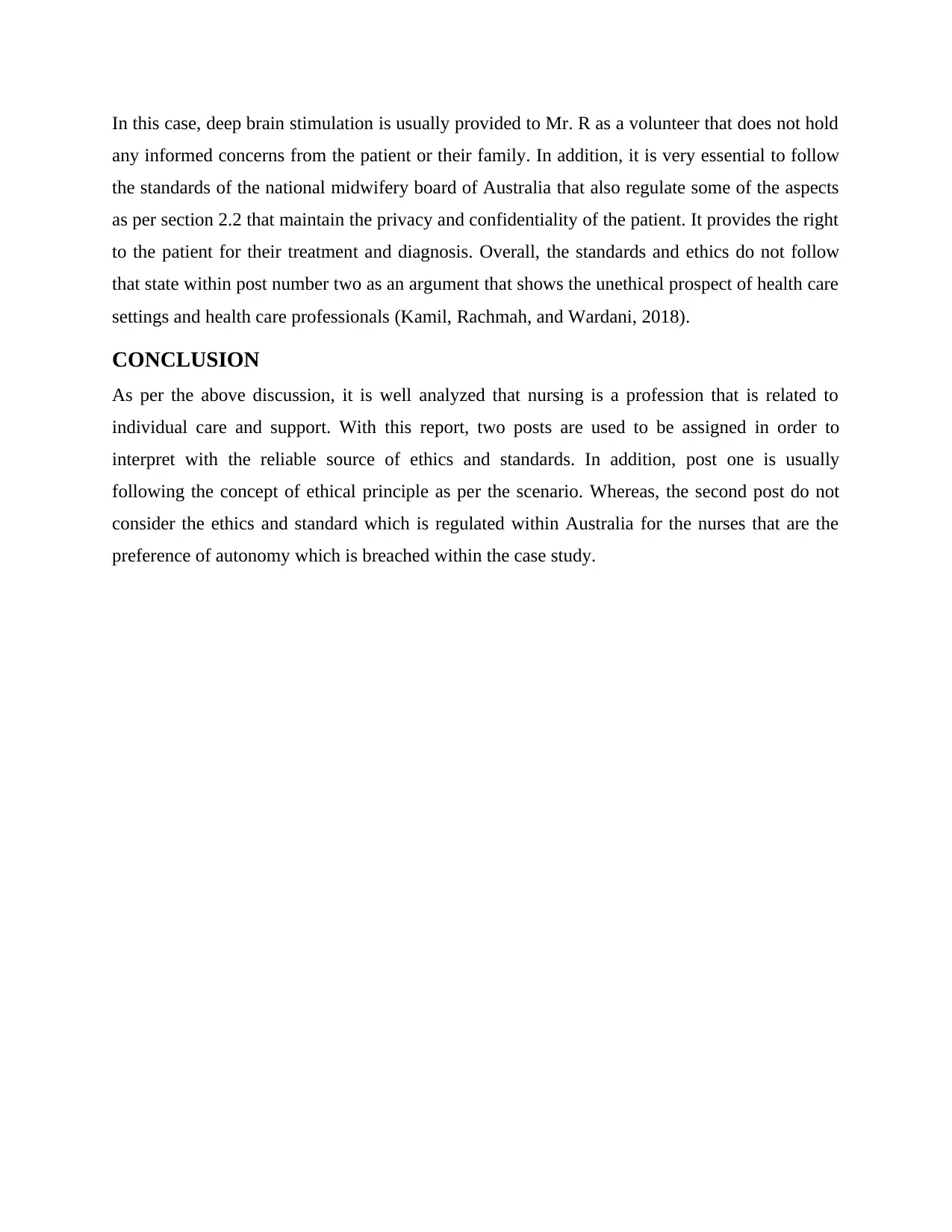
In this case, deep brain stimulation is usually provided to Mr. R as a volunteer that does not hold
any informed concerns from the patient or their family. In addition, it is very essential to follow
the standards of the national midwifery board of Australia that also regulate some of the aspects
as per section 2.2 that maintain the privacy and confidentiality of the patient. It provides the right
to the patient for their treatment and diagnosis. Overall, the standards and ethics do not follow
that state within post number two as an argument that shows the unethical prospect of health care
settings and health care professionals (Kamil, Rachmah, and Wardani, 2018).
CONCLUSION
As per the above discussion, it is well analyzed that nursing is a profession that is related to
individual care and support. With this report, two posts are used to be assigned in order to
interpret with the reliable source of ethics and standards. In addition, post one is usually
following the concept of ethical principle as per the scenario. Whereas, the second post do not
consider the ethics and standard which is regulated within Australia for the nurses that are the
preference of autonomy which is breached within the case study.
any informed concerns from the patient or their family. In addition, it is very essential to follow
the standards of the national midwifery board of Australia that also regulate some of the aspects
as per section 2.2 that maintain the privacy and confidentiality of the patient. It provides the right
to the patient for their treatment and diagnosis. Overall, the standards and ethics do not follow
that state within post number two as an argument that shows the unethical prospect of health care
settings and health care professionals (Kamil, Rachmah, and Wardani, 2018).
CONCLUSION
As per the above discussion, it is well analyzed that nursing is a profession that is related to
individual care and support. With this report, two posts are used to be assigned in order to
interpret with the reliable source of ethics and standards. In addition, post one is usually
following the concept of ethical principle as per the scenario. Whereas, the second post do not
consider the ethics and standard which is regulated within Australia for the nurses that are the
preference of autonomy which is breached within the case study.
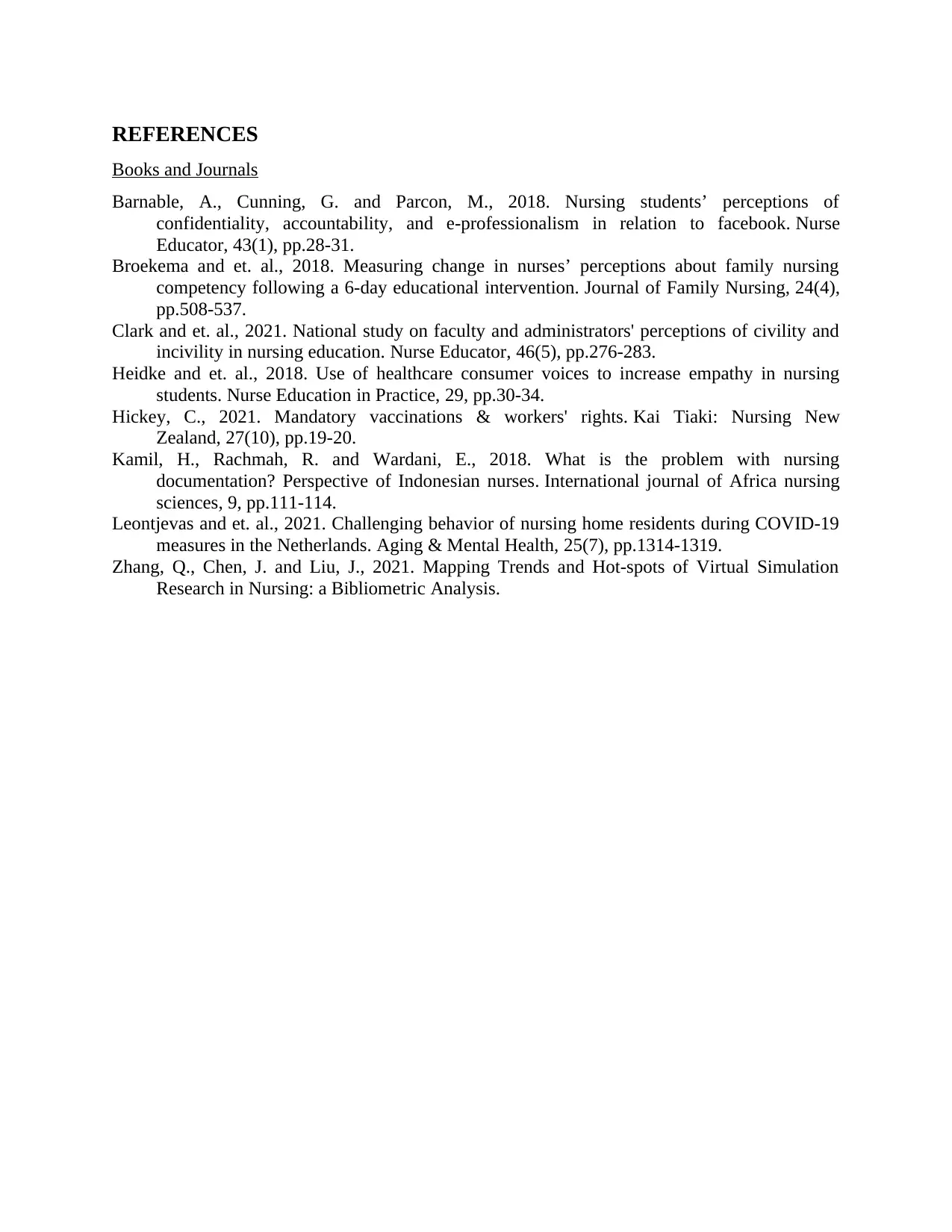
REFERENCES
Books and Journals
Barnable, A., Cunning, G. and Parcon, M., 2018. Nursing students’ perceptions of
confidentiality, accountability, and e-professionalism in relation to facebook. Nurse
Educator, 43(1), pp.28-31.
Broekema and et. al., 2018. Measuring change in nurses’ perceptions about family nursing
competency following a 6-day educational intervention. Journal of Family Nursing, 24(4),
pp.508-537.
Clark and et. al., 2021. National study on faculty and administrators' perceptions of civility and
incivility in nursing education. Nurse Educator, 46(5), pp.276-283.
Heidke and et. al., 2018. Use of healthcare consumer voices to increase empathy in nursing
students. Nurse Education in Practice, 29, pp.30-34.
Hickey, C., 2021. Mandatory vaccinations & workers' rights. Kai Tiaki: Nursing New
Zealand, 27(10), pp.19-20.
Kamil, H., Rachmah, R. and Wardani, E., 2018. What is the problem with nursing
documentation? Perspective of Indonesian nurses. International journal of Africa nursing
sciences, 9, pp.111-114.
Leontjevas and et. al., 2021. Challenging behavior of nursing home residents during COVID-19
measures in the Netherlands. Aging & Mental Health, 25(7), pp.1314-1319.
Zhang, Q., Chen, J. and Liu, J., 2021. Mapping Trends and Hot-spots of Virtual Simulation
Research in Nursing: a Bibliometric Analysis.
Books and Journals
Barnable, A., Cunning, G. and Parcon, M., 2018. Nursing students’ perceptions of
confidentiality, accountability, and e-professionalism in relation to facebook. Nurse
Educator, 43(1), pp.28-31.
Broekema and et. al., 2018. Measuring change in nurses’ perceptions about family nursing
competency following a 6-day educational intervention. Journal of Family Nursing, 24(4),
pp.508-537.
Clark and et. al., 2021. National study on faculty and administrators' perceptions of civility and
incivility in nursing education. Nurse Educator, 46(5), pp.276-283.
Heidke and et. al., 2018. Use of healthcare consumer voices to increase empathy in nursing
students. Nurse Education in Practice, 29, pp.30-34.
Hickey, C., 2021. Mandatory vaccinations & workers' rights. Kai Tiaki: Nursing New
Zealand, 27(10), pp.19-20.
Kamil, H., Rachmah, R. and Wardani, E., 2018. What is the problem with nursing
documentation? Perspective of Indonesian nurses. International journal of Africa nursing
sciences, 9, pp.111-114.
Leontjevas and et. al., 2021. Challenging behavior of nursing home residents during COVID-19
measures in the Netherlands. Aging & Mental Health, 25(7), pp.1314-1319.
Zhang, Q., Chen, J. and Liu, J., 2021. Mapping Trends and Hot-spots of Virtual Simulation
Research in Nursing: a Bibliometric Analysis.
⊘ This is a preview!⊘
Do you want full access?
Subscribe today to unlock all pages.

Trusted by 1+ million students worldwide
1 out of 6
Related Documents
Your All-in-One AI-Powered Toolkit for Academic Success.
+13062052269
info@desklib.com
Available 24*7 on WhatsApp / Email
![[object Object]](/_next/static/media/star-bottom.7253800d.svg)
Unlock your academic potential
Copyright © 2020–2026 A2Z Services. All Rights Reserved. Developed and managed by ZUCOL.





